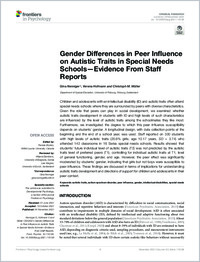Gender Differences in Peer Influence on Autistic Traits in Special Needs Schools—Evidence From Staff Reports
IPC
- Nenniger, Gina ORCID Department of Special Education, University of Fribourg, Fribourg, Switzerland
- Hofmann, Verena ORCID Department of Special Education, University of Fribourg, Fribourg, Switzerland
- Müller, Christoph Michael ORCID Department of Special Education, University of Fribourg, Fribourg, Switzerland
- 04.11.2021
Published in:
- Frontiers in Psychology. - 2021, vol. 12, p. 718726
Autistic traits
Autism spectrum disorder
Peer influence
Gender
Intellectual disabilities
Special needs schools
English
Children and adolescents with an intellectual disability (ID) and autistic traits often attend special needs schools where they are surrounded by peers with diverse characteristics. Given the role that peers can play in social development, we examined whether autistic traits development in students with ID and high levels of such characteristics are influenced by the level of autistic traits among the schoolmates they like most. Furthermore, we investigated the degree to which this peer influence susceptibility depends on students’ gender. A longitudinal design, with data collection points at the beginning and the end of a school year, was used. Staff reported on 330 students with high levels of autistic traits (20.6% girls; age 10.17 years, SD = 3.74) who attended 142 classrooms in 16 Swiss special needs schools. Results showed that students’ future individual level of autistic traits (T2) was not predicted by the autistic traits level of preferred peers (T1), controlling for individual autistic traits at T1, level of general functioning, gender, and age. However, the peer effect was significantly moderated by students’ gender, indicating that girls but not boys were susceptible to peer influence. These findings are discussed in terms of implications for understanding autistic traits development and directions of support for children and adolescents in their peer context.
- Faculty
- Faculté des lettres et des sciences humaines
- Department
- Département de Pédagogie spécialisée
- Language
-
- English
- Classification
- Special education
- Other electronic version
- License
- CC BY
- Open access status
- green
- Identifiers
- Persistent URL
- https://folia.unifr.ch/unifr/documents/320012
Statistics
Document views: 53
File downloads:
- nenniger_et_al_2021_gender.pdf: 150
